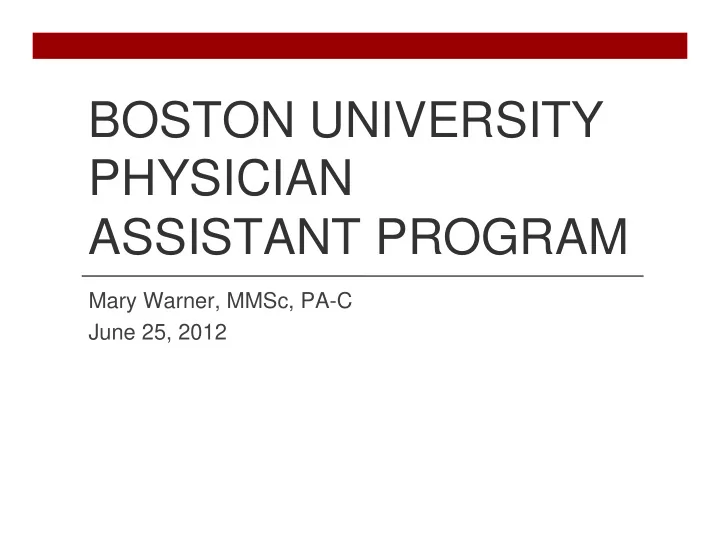

BOSTON UNIVERSITY PHYSICIAN ASSISTANT PROGRAM Mary Warner, MMSc, PA-C June 25, 2012
Presentation Outline • Overview of Physician Assistant Profession • Overview of PA Education • BU PA Program Highlights Admission Curriculum Overview • Implementation Timeline and Logistics • Questions
Definition Physician Assistants practice medicine with physician supervision.
PA Certification and Practice Characteristics NCCPA Certification Initial exam MCQ • Every 2 years-100 hours of CME: QI and SA • Every 10 years MCQ •
Physician Assistant vs. Nurse Practitioner • Practice with physician • Independent practice supervision authority • Generalists training • Specialty training • Medical Education • Nursing Education • Pass a national • Pass a national certifying exam certifying exam in their specialty • Many specialties • One specialty
Physician Assistant Education • 164 PA programs • Train 6,300 graduates/year • >15,000 applicants to CASPA • 35% of programs housed in a medical school • Average Program Length-26.5 months (range 22-36) • Divided in to 2 phases • Classroom • Clinical rotations • 90% grant masters degree • Few have a thesis
BU PA Program Mission The mission of the Boston University School of Medicine Physician Assistant Program is to educate physician assistants who will produce exceptional outcomes while caring for a diverse population of patients, including those from vulnerable communities and to cultivate leaders who will advance the physician assistant profession. We value excellence, integrity, social justice, service, and are committed to developing a successful model for interprofessional education and clinical practice.
Admissions Bachelors degree with: • a science GPA of at least 3.0 (mean ~3.6) • Biology • 1 semester general • 1 semester of human or animal physiology (preferably at the 300 or 400 level) • 3- 300 or 400 level biology courses one of which must be genetics • Chemistry • 1 semester general chem with lab • 1 semester organic chem with lab • 1 semester of biochemistry • GRE scores in the 50th percentile or better. • English proficiency, demonstrated by a minimum TOEFL score greater than 80 for internet-based exam or 550 for paper-based exam (foreign grads).
Didactic Curriculum MAY JUNE JULY AUG SEPT OCT NOV DEC JAN FEB MARCH APRIL MAY ANATOMY PHYSIOLOGY FOUNDATIONS OF MEDICINE: GEN, CELL BIO, BIOCHEM, IMMUNO, MICRO, PATH PHARMACOLOGY DIAGNOSTIC METHODS FUNDAMENTALS OF CLINICAL MEDICINE (THE MODULES) INTRO TO RESEARCH JOURNAL CLUBS PREVENTIVE MED HISTORY AND PHYSICAL EXAM CLINICAL PRACTICUM I CLINICAL PRACTICUM II
Clinical Curriculum MANDATORY ELECTIVE (5) • INTERNAL MEDICINE (2) • PEDIATRIC SUBSPECIALTIES • FAMILY MEDICINE (2) • INTERNAL MEDICINE • PEDIATRICS SUBSPECIALTIES • OB-GYN • SURGICAL • PSYCHIATRY SUBSPECIALTIES • EMERGENCY MEDICINE • SURGERY • SUBINTERNSHIPS
Research Curriculum Thesis proposal- No data collection or oral defense required 3 Chapters: Review of the Literature and Analysis Methods Evaluation of the Impact, strength/ weaknesses Topics: Clinical PA Education PA workforce
Implementation and Logistics I
Implementation and Logistics II
Questions
Recommend
More recommend